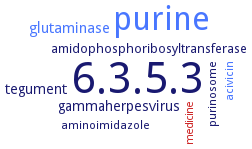6.3.5.3: phosphoribosylformylglycinamidine synthase
This is an abbreviated version!
For detailed information about phosphoribosylformylglycinamidine synthase, go to the full flat file.

Word Map on EC 6.3.5.3 
-
6.3.5.3
-
purine
-
glutaminase
-
tegument
-
gammaherpesvirus
-
amidophosphoribosyltransferase
-
aminoimidazole
-
purinosome
-
acivicin
-
medicine
- 6.3.5.3
- purine
- glutaminase
- tegument
-
gammaherpesvirus
- amidophosphoribosyltransferase
-
aminoimidazole
-
purinosome
- acivicin
- medicine
Reaction
Synonyms
2-Formamido-N-ribosylacetamide 5'-phosphate:L-glutamine amido-ligase (adenosine diphosphate), 5'-phosphoribosylformyl glycinamidine synthetase, FGAM, FGAM synthase, FGAM synthetase, FGAM-synthetase, FGAMS, FGAR amidotransferase, FGAR-AT, FGARAT, formylglycinamide ribonucleotide amidotransferase, formylglycinamide ribonucleotide amidotransferase complex, Formylglycinamide ribonucloetide amidotransferase, Formylglycinamide ribotide amidotransferase, Formylglycinamide ribotide synthetase, formylglycinamide synthetase, LT2, mPurL, ORF75c, PFAS, phosphoribosylformylglycinamidine synthase II, Phosphoribosylformylglycinamidine synthetase, Phosphoribosylformylglycineamidine synthetase, Pur4, PurL, PurS, smPurL, StPurL, Synthetase, phosphoribosylformylglycinamide, TmPurL


 results (
results ( results (
results ( top
top






